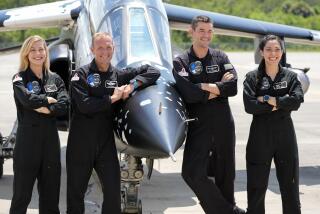Shuttle Schedule Altered by Desert Wind; Astronaut and Costa Rica President Chat
- Share via
HOUSTON — The space shuttle Atlantis is now scheduled to cut its five-day mission short by 1 1/2 hours Monday because high afternoon winds are forecast at Edwards Air Force Base in the Mojave Desert, space agency officials said Saturday.
The new plan is to land one orbit earlier, at 11:08 a.m. PDT instead of 12:43 p.m., because the winds are expected to be lighter earlier in the day.
The five astronauts aboard the Atlantis spent Saturday running a series of experiments and chatting briefly with Oscar Arias Sanchez, president of Costa Rica. Crewman Franklin R. Chang-Diaz, 39, was born in San Jose, Costa Rica, and spoke in Spanish for several minutes with the president.
Chang-Diaz, a plasma physicist, is now a U.S. citizen.
“You raise high the name of Costa Rica and Latin America in general,” Arias told Chang-Diaz.
Although the shuttle is scheduled to land Monday at Edwards, there is a slim chance that weather will force the mission to be extended.
Ron Dittemore, a flight director at the Johnson Space Center here, said the National Aeronautics and Space Administration is keeping all options open and has asked the crew to shut off any unnecessary electronics gear to save fuel in case weather shuts down Edwards entirely Monday.
Normally, the shuttle carries enough fuel to extend its mission by two days, which means Atlantis could orbit the Earth without trouble until Wednesday, but officials would like to make the fuel last an additional day for added safety.
“We’ve asked the crew to minimize the lighting and turn off any unnecessary equipment,” Dittemore said. “These are real power savers.”
Dittemore said the winds at Edwards were supposed to range around 20 knots with gusts up to 30 knots out of the southwest by early afternoon Monday, and that is beyond the limits set by NASA for a shuttle landing.
“Before noon, the winds are supposed to be 12 knots with gusts to 18, and that would be fine for us to land,” he said.
The mission’s primary objective was accomplished on the first day in orbit when the Galileo spacecraft was dispatched from the shuttle on a six-year journey to Jupiter. Scientists at the Jet Propulsion Laboratory in Pasadena said Saturday that the unmanned spacecraft has already had its scientific baptismal.
A powerful solar flare bombarded Galileo with high energy particles traveling 1 million m.p.h., and JPL scientists used instruments aboard the sophisticated spacecraft to study the phenomenon.
Galileo scientists “are quite ecstatic with the data they are seeing and with the opportunity to observe the solar flare,” said Neal Ausman, science manager for the project.
More to Read
Sign up for Essential California
The most important California stories and recommendations in your inbox every morning.
You may occasionally receive promotional content from the Los Angeles Times.











